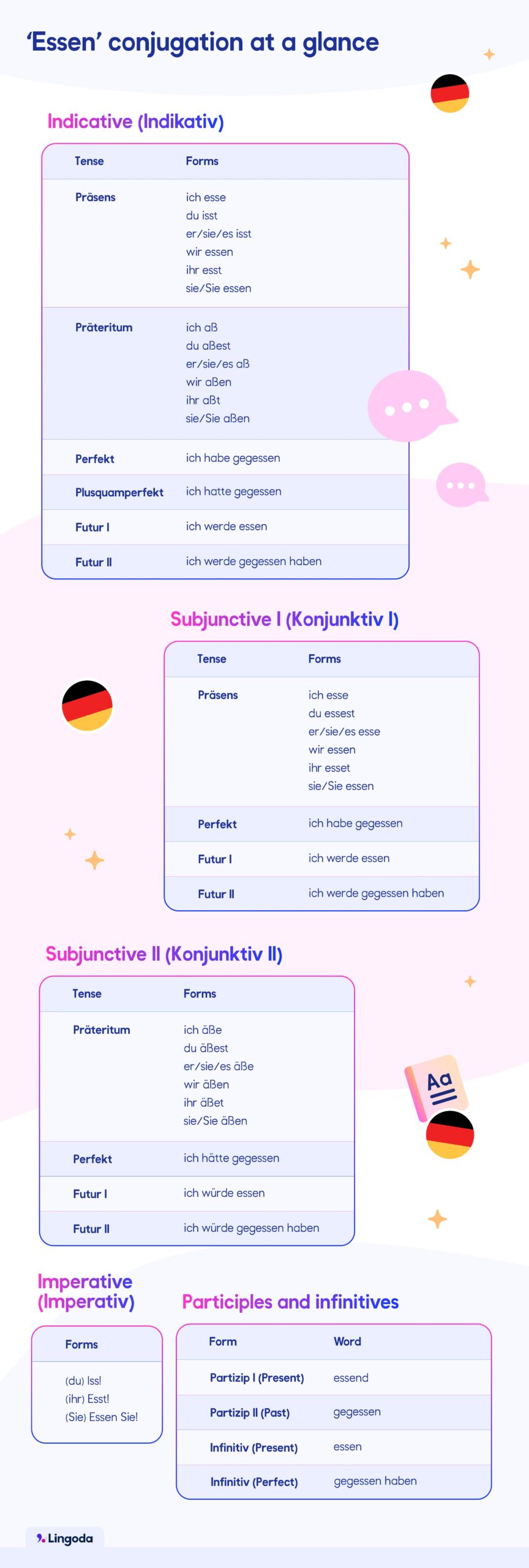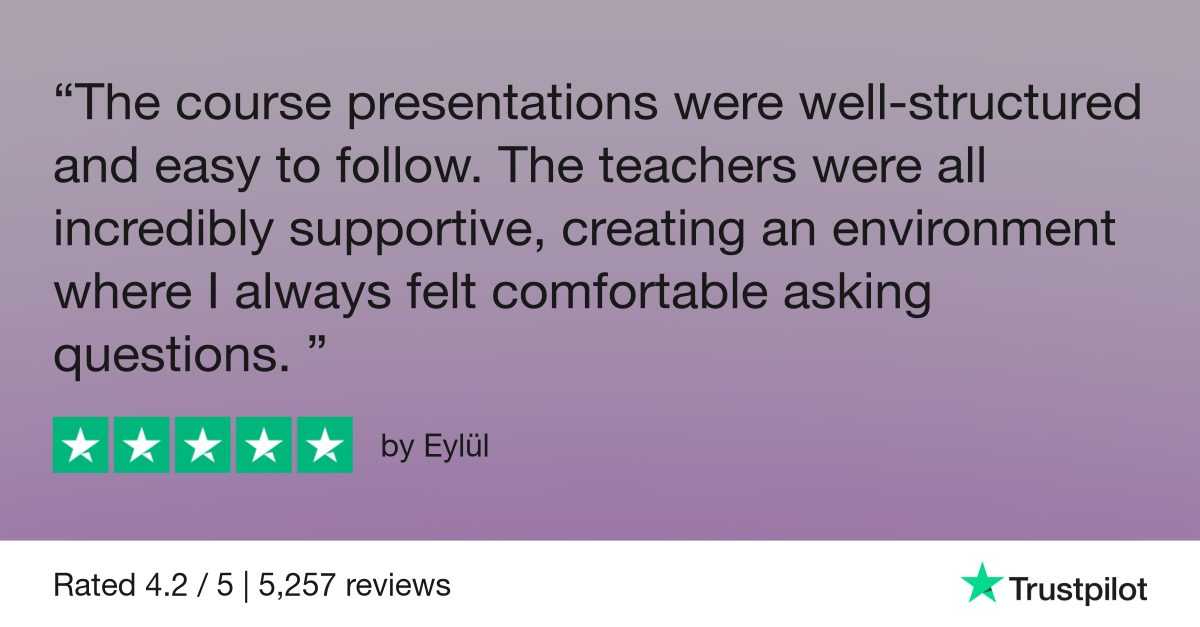The ultimate guide to conjugating ‘essen’ in German
If there’s one verb you’re guaranteed to hear early and often in German, it’s essen (to eat). And with good reason.

Food is a major part of life in Germany, from long brunches and beer garden debates to heartfelt sayings like “Wir sind, was wir essen” (“We are what we eat”). So, learning the essen conjugation is more than merely helpful — it’s social survival.
The catch? Essen is an irregular verb, meaning its forms don’t always follow nice, tidy patterns. But once you’ve got it down, it becomes a trusty tool, whether you’re talking about dinner plans, traditional dishes or just how hungry you are.
In this guide, we’ll walk you through every tense and variation of essen, from ich esse (I eat) to wir werden gegessen haben (we will have eaten). It’s just what you need to start sounding like you know your way around both the language and the lunch menu.
Ready? Let’s dig in.
- Overview of all the tenses of the essen conjugation
- Present tense (Präsens)
- Past tenses (Präteritum, Perfekt and Plusquamperfekt)
- Future tenses (Futur I and Futur II)
- Other forms and moods
- Essen in the passive voice
- FAQs
Overview of all the tenses of the ‘essen’ conjugation
Before we dive into the specifics, let’s get a bird’s-eye view of how essen behaves across all the major German tenses. This irregular verb keeps things interesting, especially in the du and er/sie/es forms, where the stem vowel often shifts (e → i or a → ä).
Some of the following forms are more common in spoken German, while others are reserved for writing or formal speech. But together, they give you a full toolkit for talking about anything from last night’s dinner to future feasts.

Present tense (‘Präsens’)
In the present tense, essen is irregular, which means it doesn’t follow the standard pattern for -en verbs. This is your go-to for most everyday meal talk, and you can use it to discuss what you like or what you’re having.
Conjugation and stem change
The main thing to watch for is a stem vowel change from e → i in the du and er/sie/es forms. That and the double “s”, which often trips up learners but doesn't change pronunciation dramatically (it just makes the spelling look a bit spicy).
| ich | esse |
| du | isst |
| er/sie/es | isst |
| wir | essen |
| ihr | esst |
| sie/Sie | essen |
Du isst zu schnell! (You eat too fast!)

Learn German with Lingoda
How it works

Past tenses (‘Präteritum’, ‘Perfekt’ and ‘Plusquamperfekt’)
Talking about what you’ve eaten, what you ate yesterday, or what you had already eaten before dessert showed up? That’s where German past tenses come in.
Simple past (‘Präteritum’)
The Präteritum is used mostly in written German (e.g., literature, news, reports), but it’s still important to recognize.
| ich | aß |
| du | aßest |
| er/sie/es | aß |
| wir | aßen |
| ihr | aßt |
| sie/Sie | aßen |
Ich aß ein Brötchen. (I ate a bread roll.)
Present perfect (‘Perfekt’)
This is the go-to tense when discussing completed past actions in spoken German. It uses the auxiliary verb haben and the past participle of essen, gegessen.
| ich | habe gegessen |
| du | hast gegessen |
| er/sie/es | hat gegessen |
| wir | haben gegessen |
| ihr | habt gegessen |
| sie/Sie | hatten gegessen |
Ich habe zum Mittagessen eine Wurst gegessen. (I’ve eaten a sausage for lunch.)
Compare and choose
So which past tense should you use?
- Perfekt: Use it in everyday conversations.
Gestern habe ich Pizza gegessen. - Präteritum: Use it in formal writing or storytelling.
Gestern aß ich Pizza.
If you're speaking, default to Perfekt unless you're dealing with modal verbs like konnte and musste, which tend to stick with the Präteritum.
Pluperfect (‘Plusquamperfekt’)
This tense is used when talking about something that had already happened before another past action. It’s formed with hatte + gegessen.
Use it when you need to express past-before-past logic, i.e., when one event in the past happened before another event in the past.
| ich | hatte gegessen |
| du | hattest gegessen |
| er/sie/es | hatte gegessen |
| wir | hatten gegessen |
| ihr | hattet gegessen |
| sie/Sie | hatten gegessen |
Ich hatte gegessen, bevor er ankam. (I had eaten before he arrived.)
Future tenses (‘Futur I’ and ‘Futur II’)
Talking about what you will eat or what you will have eaten? German’s got you covered with two future tenses. They're both built with the auxiliary verb werden, plus either the infinitive or the past participle of essen (essen and gegessen, respectively).
‘Futur I’
Otherwise known as the simple present, Futur I is the tense that expresses what will happen or what you plan to do. Its structure is werden + essen.
| ich | werde essen |
| du | wirst essen |
| er/sie/es | wird essen |
| wir | werden essen |
| ihr | werdet essen |
| sie/Sie | werden essen |
‘Futur II’
Used the Futur II to describe something that will have been completed in the future. Its structure is a bit more complicated: werden + gegessen haben.
| ich | werde gegessen haben |
| du | wirst gegessen haben |
| er/sie/es | wird gegessen haben |
| wir | werden gegessen haben |
| ihr | werdet gegessen haben |
| sie/Sie | werden gegessen haben |
Bis morgen werde ich gegessen haben. (I will have eaten by tomorrow.)
It sounds convoluted, but it’s really just a long, polite way of saying that something is already done — just not yet.
Other forms and moods
While tenses handle time, moods deal with attitude. Whether you’re giving orders, quoting someone or daydreaming about endless buffets, German has a form of essen that fits your needs.
Imperative (‘Imperativ’)
Want to tell someone to eat their vegetables? Use the imperative form. It varies by how formal or familiar you are with the person.
| du | Iss! |
| ihr | Esst! |
| Sie | Essen Sie! |
Iss dein Frühstück! (Eat your breakfast!)
Essen Sie bitte langsam. (Please eat slowly.)
Subjunctive I and II (‘Konjunktiv I’ and ‘Konjunktiv II’)
Konjunktiv I (indirect speech) is used mainly in reported speech, particularly in writing or journalism.
| ich | esse |
| du | essest |
| er/sie/es | esse |
| wir | essen |
| ihr | esset |
| sie/Sie | essen |
Er sagt, er esse kein Fleisch. (He says he doesn’t eat meat.)
Konjunktiv II is used for dreams, regrets, polite requests, hypotheticals and wishes.
| ich | äße |
| du | äßest |
| er/sie/es | äße |
| wir | äßen |
| ihr | äßet |
| sie/Sie | äßen |
Ich wünschte, ich äße mehr Gemüse. (I wish I ate more vegetables.)
Note: In spoken German, people often use würde essen instead of äße — it’s simpler and more common.
Participles and infinitives
You’ll also come across essen in these useful non-finite forms:
| Infinitive | essen | Used after modal verbs (Ich will essen.) |
| Present participle | essend | Uncommon, used adjectivally (Ein essender Mensch.) |
| Past participle | gegessen | Used for Perfekt, Plusquamperfekt and Futur II |
‘Essen’ in the passive voice
In German, the passive voice comes in two flavors:
Vorgangspassiv (action passive) focuses on the action itself; the emphasis is on the process. It doesn’t say who is performing an action — just that it’s happening. It’s formed with werden + past participle.
Die Pizza wird gegessen. (The pizza is being eaten.)
Zustandspassiv (state passive) describes the resulting state after the action is done. It’s formed with sein + past participle.
Das Essen ist gegessen. (The food is eaten.)
Is ‘essen’ a regular or irregular verb?
Essen is irregular — it doesn’t follow standard conjugation patterns.
What’s the stem change in ‘du’ and ‘er’?
The e in essen changes to i when used with the du and er/sie/es subjects, like so: du isst, er/sie/es isst.
Wrapping up: Mastering the ‘essen’ conjugation is just the beginning
The verb essen might seem small, but it spans a big grammatical world — from irregular stem changes to future tenses, subjunctive moods and even passive voice. Whether you’re talking about last night’s dinner or dreaming about your next one, knowing how to use essen correctly makes you sound more fluent and natural.And the good news? You don’t have to do it alone. Lingoda’s small group classes and native-level teachers help you learn German for real-life situations, so you don’t just memorize forms — you actually use them!

Learn German with Lingoda
How it works

















